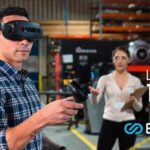Discover the remarkable benefits of VR training that are revolutionizing the way we learn and acquire new skills. Dive into this comprehensive guide to explore the advantages, applications, and future potential of virtual reality training.
Benefits of VR Training: A Paradigm Shift in Learning
Welcome to the captivating realm of VR training, where learning transcends the boundaries of the physical world and ventures into the immersive landscapes of digital dimensions. Are you ready to embark on a journey that unveils the astonishing benefits of VR training? As technology continues to evolve, so do the methods of education and skill development. In this article, we will delve deep into the myriad advantages that VR training brings to the table. From enhanced engagement and accelerated learning to cost-efficiency and real-world simulations, you’re about to discover why VR training is the future of education.
Picture this: you step into a virtual environment that replicates your workplace, a medical operating room, or even an ancient archaeological site. With VR training, you’re not just a passive observer but an active participant. Let’s explore the unparalleled advantages that set VR training apart:
Immersive Learning Experience
Have you ever wished to walk in the shoes of a surgeon, an astronaut, or a historian? VR training makes this a reality. By immersing learners in lifelike scenarios, it engages multiple senses and creates an unparalleled learning experience. As a result, complex concepts become easier to grasp, making the educational process more effective.
Accelerated Skill Acquisition
Traditional learning methods often require extensive time commitments to master a skill. VR training, on the other hand, accelerates skill acquisition. The immersive nature of VR fosters a ‘learn by doing’ approach, allowing learners to practice and refine their abilities in a risk-free environment. Whether it’s flying an aircraft or conducting chemistry experiments, VR training expedites the learning curve.
Enhanced Retention and Recall
Ever struggled to remember what you learned in a classroom setting? VR training addresses this challenge by leveraging the power of experiential learning. When individuals actively participate in simulations, they form stronger neural connections, leading to improved retention and recall. This means learners are more likely to remember and apply what they’ve learned.
Real-world Simulations
Imagine training for high-pressure situations like firefighting or emergency medical procedures. VR training allows learners to simulate these scenarios realistically, enabling them to develop critical decision-making skills under pressure. The result? Better-prepared professionals who can handle real-world challenges with confidence and composure.
Cost-Efficient Training
Conventional training methods often come with hefty price tags, from travel expenses to equipment costs. VR training significantly reduces these expenditures by creating a virtual environment that replicates training scenarios. This not only saves money but also ensures consistent training quality across geographically dispersed teams.
Accessibility and Flexibility
VR training transcends geographical boundaries, making education accessible to learners worldwide. Whether you’re in a bustling city or a remote village, as long as you have access to VR technology, you can engage in high-quality training. Furthermore, VR training offers flexibility in scheduling, allowing learners to choose when and where to train.
Exploring Industry Specific Benefits of VR Training
The applications of VR training span across a wide spectrum of industries, each benefiting from its unique advantages. Let’s take a closer look at how VR training is making waves in various fields:
Manufacturing and Engineering
In the world of manufacturing and engineering, precision and attention to detail are paramount. VR training allows engineers and technicians to interact with virtual prototypes, test machinery, and troubleshoot potential issues before physical production. This reduces costly mistakes, accelerates product development, and streamlines the manufacturing process.
Recent research indicates that industrial manufacturers are facing a substantial annual expense of $50 billion due to unplanned downtime. This significant financial impact underscores the importance of addressing the issue to effectively reduce losses. These costs encompass labor, production, and revenue setbacks, some of which can be attributed to inadequately trained personnel mishandling machinery.
Education and Skill Development
In the realm of education, VR training opens doors to engaging and interactive learning experiences. Students can travel back in time to historical events, explore the depths of the ocean, or dissect virtual organisms. This hands-on approach fosters curiosity and deeper understanding, turning complex subjects into captivating adventures. Companies like LMS365 have already taken the virtual leap and adapted the SynergyXR platform to bring immersive XR capabilities to company learning and training.
Healthcare and Medical Training
In the realm of healthcare, precision and expertise are paramount. VR training offers medical professionals a platform to practice surgical procedures, diagnose illnesses, and refine their skills in a controlled environment, which has proven an integral part of new medical training. Surgeons can perform virtual surgeries, nurses can simulate patient care scenarios, and medical students can explore intricate anatomical structures. This not only enhances their proficiency but also contributes to improved patient outcomes.
Aviation and Aerospace
The aviation industry demands rigorous training to ensure the safety of both passengers and crew. With VR training, pilots can simulate flying conditions, emergency scenarios, and cockpit procedures. This hands-on experience prepares them for real-life situations, from takeoff to landing, without the risks associated with traditional training methods. Additionally, maintenance crews can practice complex repairs on virtual aircraft, minimizing downtime and ensuring optimal performance.
Conclusion: The benefits of VR training
In a world where innovation knows no bounds, VR training emerges as a beacon of transformation in the realm of education and skill development. The benefits of VR training are undeniable, offering an immersive, effective, and cost-efficient approach to learning. As industries continue to embrace this revolutionary method, we can only anticipate its continued growth and evolution. So, are you ready to step into a world where learning knows no limits? The possibilities are boundless, and the benefits of VR training are waiting to be explored. Embark on this journey and unlock a new dimension in learning today.
Quelle:


